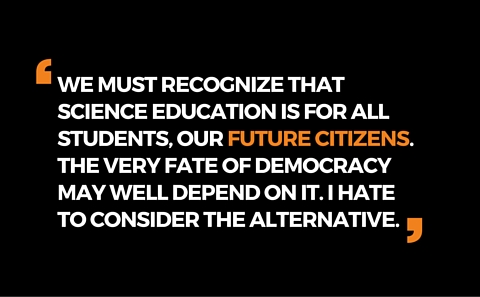Can Science Teachers Save Our Democracy?
By David Evans, NSTA Executive Director
Posted on 2015-10-14
A few months ago, I started to write an op-ed with the statement that science teachers are saving our democracy. Why do I believe this? Because science teachers provide the tools our children need to remain well-informed, participatory citizens. Jefferson said, “Whenever the people are well-informed, they can be trusted with their own governance.” Today there are (well-financed) anti-science campaigns against teaching evolution or teaching about climate change that represent serious threats to the very basis of our democracy. The only viable defense against these threats is scientific literacy, and the defensive lineup consists of science teachers. “Scientific” knowledge, shared among all citizens, should be the basis for public policy as opposed to an appeal to “revealed knowledge” or authority.
Recently, while looking through old books at the local library book sale, I came across the Winter 1940 volume of Science and Society. The lead article underscored the role of science teachers as critical links in preserving democracy. J. D. Bernal, one of the fathers of crystallography, wrote “Science Teaching in General Education” and much of it sounds as if it were written yesterday afternoon. He presaged the Next Generation Science Standards (NGSS) when he said:
The old methods of teaching, with their formal approach, and their rigid separation between science and the humanities, are plainly incompetent to deal with these developments [the development of the importance of science]. The attempt to apply them results in parrot-like learning, in a stifling of intelligence and criticism, and in the production of individuals who know so little of the major factors affecting their lives that they are more at the mercy of demagogues and quacks than an illiterate population…. The reform of education is not a luxury; it is a necessity if we are to safeguard existing democracy.
And speaking of traditional science education, Bernal goes on:
At its worst, it simply handed out information that was so out of relation with life as to become meaningless and impossible to remember. The greatest defect of scientific education in the past has been its inability to transmit the most characteristic aspect of science, namely, its method. It is most important that all, and particularly those who are not continuing in scientific careers, should learn scientific method by practicing it.
And how did he characterize the objectives of science education?
The first objective is to provide enough understanding of the science in society to enable the great majority that will not be actively engaged in scientific pursuits to collaborate intelligently with who are, and to be able to criticize or appreciate the effect of science on society.
The second objective, which is not entirely distinct, is to give a practical understanding of the method of science [i.e., scientific practices] sufficient to be applicable to the problems that the citizen has to face in his individual and social life.
Finally, Bernal discusses the critical role of science teachers in achieving those objectives and the need for educators to use real-world problems to connect with their students and their community. Perhaps most importantly, he reflects on the role of the science teacher in the face of the “anti-scientific and anti-social forces [that] are powerfully entrenched in the school system.” The widespread adoption and implementation of NGSS by teachers, even in non-adopting states, is a testament to their enlightened commitment to reason.
Sadly, anti-scientific and anti-social forces are still powerfully entrenched in the school system. As we move ahead into the 2016 election season, and as we continue to address almost daily threats to the teaching of evolution and climate change, we must insist that our thought leaders are committed to supporting science education that emphasizes the practices of science over those hard to remember “facts.” We must recognize that science education is for all students, our future citizens. The very fate of democracy may well depend on it. I hate to consider the alternative.
 Dr. David L. Evans is the Executive Director of the National Science Teachers Association (NSTA). Reach him at devans@nsta.org or via Twitter @devans_NSTA.
Dr. David L. Evans is the Executive Director of the National Science Teachers Association (NSTA). Reach him at devans@nsta.org or via Twitter @devans_NSTA.
The mission of NSTA is to promote excellence and innovation in science teaching and learning for all.
Follow NSTA
Disclaimer: The views expressed in this blog post are those of the author(s) and do not necessarily reflect the official position of the National Science Teaching Association (NSTA).



